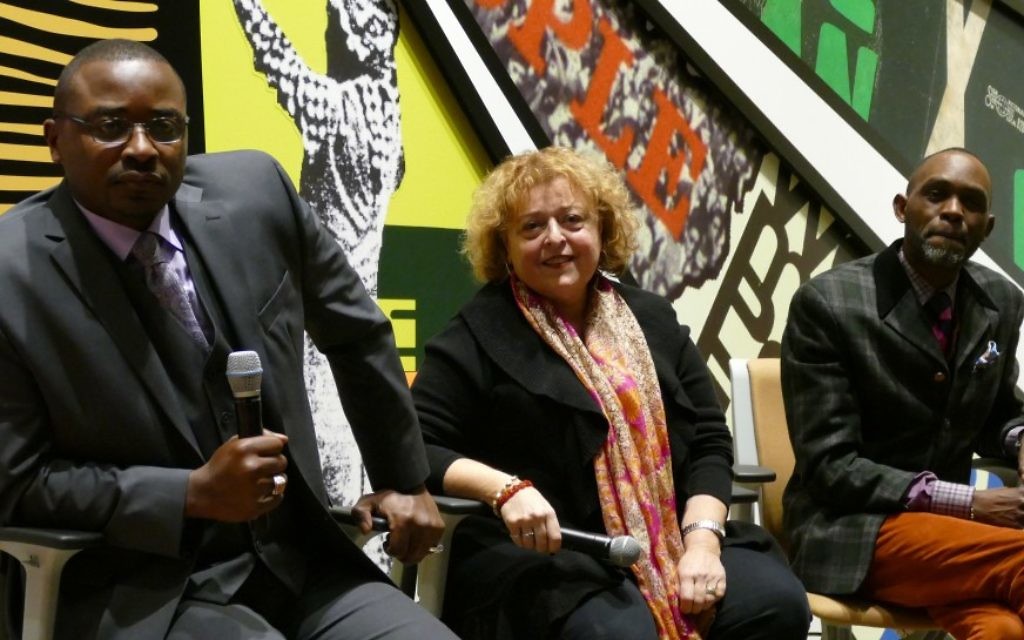Dance Gives Life to Voice Hitler Silenced

The rise of the Nazis meant the demise of Czech composer Erwin Schulhoff, whose jazz-inspired, avant-garde classical compositions were blacklisted as the work of a Jew.
Under German occupation in Prague starting in 1939, Schulhoff desperately tried to escape to the United States, then to the Soviet Union, but he was arrested in 1941 and died the next year at the Wulzburg concentration camp in Bavaria.
The intention was to silence Schulhoff, but although he never made it to America, his music did. His percussive 1925 piece “Ogelala,” about a pre-Columbian Mexican warrior, provides the score to a complex dance called “No Longer Silent,” being performed by the Alvin Ailey American Dance Theater twice at the Fox Theatre in mid-February.
Get The AJT Newsletter by email and never miss our top stories Free Sign Up
“Thank you for bringing Schulhoff to life again,” Lili Baxter, the director of the Breman Museum’s Weinberg Center for Holocaust Education, said during a panel discussion about the work Wednesday night, Jan. 20, at the National Center for Civil and Human Rights. “So many artists were silenced.”
She sat next to the choreographer who created the dance in 2007, Robert Battle, who has been the Alvin Ailey artistic director since 2011.
Battle said famous composers turned the commission down before his alma mater, Juilliard, asked him in 2007 to create a dance using music written by victims of the Nazis. He said he found the music interesting, and “No Longer Silent” is his impression of Schulhoff’s life in dance.
Modern dance is about being seen and heard, Battle said, and is an example of art as a weapon of change. “There are echoes of what history can teach us,” he said. The goal is “to have work that shakes our consciousness and calls on our heart.”
Music can say things that can’t be fully expressed in words, said Derreck Kayongo, the new CEO of the rights center. He broke into an a cappella “We Shall Overcome” to demonstrate music’s power to express revolutionary ideas.
Baxter compared “We Shall Overcome” and its role in the civil rights movement to “The Partisan Hymn” and its inspiration for Jews who resisted the Nazis.
“Sometimes even in the darkest, most awful times, there’s something about music, there’s something about dance and movement (and) inspiring words like Maya Angelou’s that give us a sense that, yes, we can create a better world,” she said.
Part of the specific power of “No Longer Silent” is its connection to the enduring issue of refugees. Both Kayongo and Baxter are former refugees who were welcomed by the United States.
But Baxter, who was born in a displaced persons camp in Sweden in 1946, noted that the door was closed to Schulhoff and millions of others before World War II. When the United States and 31 other countries met in Evian, France, in July 1938 to discuss the growing crisis of Jews trying to escape Hitler, only the Dominican Republic offered to accept any refugees, and Baxter said that was a cynical attempt to lighten the population compared with neighboring Haiti, not a genuine humanitarian effort.
The failure of the Evian conference gave Hitler a green light, she said, leading directly to Kristallnacht a few months later.
Such big-picture history, even when it parallels modern problems, can be lost on students. Baxter said history reaches young people when something old like “Ogelala” is made new through a creation like “No Longer Silent” that tells one person’s story. The lessons learned about persecution and injustice three-quarters of a century ago translate to teens’ lives today as a message against bullying and for mutual respect and human rights.
“The key to human beings is rights,” Kayongo said. “If you can understand rights, you can understand everything.”
What: “No Longer Silent”
Who: Alvin Ailey American Dance Theater
Where: Fox Theatre, 660 Peachtree St., Midtown
When: 8 p.m. Wednesday, Feb. 10, and Saturday, Feb. 13 (other dances are part of those programs and will be performed other nights that week)
Tickets: $25 and up; www.foxatltix.com or 855-285-8499





comments